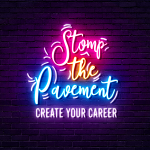Whether you’re just starting your career, getting through a tough time, or changing career paths, you might feel unqualified when you have little or no experience on your resume. However, I bet you have more (way more) than you think you do! Let’s cover my insider tips for writing a resume with no experience (and using the experience you DO have!)
Don’t worry- you’re not the only one who’s ever wondered how to make a resume with no experience.
I’ll let you in on a little secret: most clients who ask about writing a resume with no experience have way more than they think!
Why?
Because your resume doesn’t have to just be paid or related work experience: you’re so much more than the work you do for an employer!
In your coursework, extra activities, class projects, and side gigs, you use important skills. These are your transferable skills, like:
- Communication
- Teamwork
- Leadership
- Independence
- Organization
- And more!
Transferable skills are the key to writing a resume with no work experience. Emphasizing skills you’ve used in the past- even if you weren’t paid- shows what you’re capable of.
We’ll talk more about how to know which transferable skills are most important soon! First, here’s a quick overview of what we’ll be going over:
- Other experiences you can use on your resume
- How to figure out which skills are most important
- My insider tricks to get your resume to 1 full page
Alright, let’s dive into how to write a resume with no experience!

Before we get started, did you know the best way to land a job with no experience is networking? Watch this FREE workshop to learn how to escape the toxic job search cycle and start networking right away!
80% OF JOBS ARE ON THE HIDDEN MARKET—
LEARN HOW TO FIND THEM IN THIS FREE WORKSHOP
Are online job apps making your career sour? The key to candy coating your career is networking!
In this FREE workshop, I’ll teach you how to ditch your resume & grow the best resource you have as a job seeker: your network!
Use your coursework
If you’re a college student writing a resume with no work experience,you still have valuable experience!
College courses involve hard (usually relevant) work, so you def get to use some of them on your resume. There are a couple different ways to put coursework on your resume:
- Create a “Related Coursework” section on your resume and list relevant classes.
- There’s 1 big rule for this section, if you have it: DON’T use any entry level or 101 classes.
Why? Because they’re usually too surface level and open to count as notable enough for your resume.
Besides that, you can include any classes you think will appeal to the employer!
- There’s 1 big rule for this section, if you have it: DON’T use any entry level or 101 classes.
- Add large projects to your “Related Experience” section, and describe them with bullet points, like you would for a job or internship.
- In your bullet points, describe your role, the group dynamics, results, related numbers or data, and anything else that shows how this project was more than a typical school assignment.
You have to emphasize how impressive and involved your project was, so they see it as related to the position and noteworthy enough for your resume.
- In your bullet points, describe your role, the group dynamics, results, related numbers or data, and anything else that shows how this project was more than a typical school assignment.
Hop over to How to Put Related Coursework on your Resume for more info!
Write what they want
Whatever experience you do have, whether it’s a time consuming class project or a part-time job, there are a few ways to use language to your advantage.
Employers aren’t just looking at your work experience. They also want you to have related skills. By learning how to write about your skills, you’ll instantly make any experience relevant to the job.
Like I mentioned before, when you’re writing a resume with no experience, transferable skills are your best friend. For a refresh: transferable skills are ones that apply to almost any position (they can be transferred) like leadership, communication, teamwork, organization, etc.
Struggling to talk about yourself? Check out this quick video on practicing the most important transferable skill- self confidence!
You’ve used these a lot- whether it’s in class or at your part time job- so you definitely have examples to show your skills!
Here’s the trick to knowing which transferable skills are most important to each employer:
- When you read a job description, look for the keywords they use to describe the skills they’re looking for (for example, one position might say “multitask” while the other could say “perform simultaneous duties”)
- Use those exact keywords to describe the same skills in the experiences you have
By emphasizing the transferable skills you’ve used and writing about them with the same language from the job description, you become impressive, relevant, and credible.
Tricks to get 1 full page on a resume with no experience
When you’re writing a resume with no work experience, there are a couple formatting tricks you can use to make sure your resume fills up an entire page.
Name Size
Your name should always be the biggest thing on your resume, and you can totally use this to your advantage when you’re writing a work resume with no experience.
80% OF JOBS ARE ON THE HIDDEN MARKET—
LEARN HOW TO FIND THEM IN THIS FREE WORKSHOP
Are online job apps making your career sour? The key to candy coating your career is networking!
In this FREE workshop, I’ll teach you how to ditch your resume & grow the best resource you have as a job seeker: your network!
Now, def don’t go overboard, but try increasing the size of your name as much as you can on your resume with no experience.
The key is finding a size that takes up space without making it obvious you’re trying to take up space. Make sure it still looks balanced and proportional to the rest of your resume from far away!
It might sound tricky, but I promise you’ll be able to find the right size. Just keep zooming out to check how your resume looks from a distance, so you can see what they’ll see the first time they look at it.
If it still doesn’t take up one full page, don’t worry- I have more little tricks to get your work resume with no experience to 1 full page!

Get Sneaky
Remember those requirements for school papers? Exactly this many pages, Times New Roman font, size 12, one inch margins, blah blah blah…
Now, remember all the tricks people would use to get around them? They’d widen the margins a bit, make the periods a size bigger, add invisible words to meet a word count, etc…
They were always creative, but they didn’t usually make it past your teacher.
I have good news.
The person reading your resume is NOT your teacher or professor.
They’re the employee (or computer program) who has to read the resumes. They’re not looking for a strict word count or font size- they just want a quality summary of YOU as a professional.
This means, you can use any font, text size, and margins you want (within reason, of course). So start experimenting with ways you can tweak your resume to make your experiences take up more space.
For example, you can:
- Make your margins 1.5 inches
- Increase the font size of your headings
- Choose a font that’s larger than others
- Use white space as a divider between your headings and experiences
Whatever tricks you try, make sure you’re consistent, subtle, and hitting one page.
Once you find a good balance of subtle tricks, you should have a full page resume with no work experience!
If you have to write a resume with no experience, don’t worry! You still have plenty of options to expand on the experiences you do have and fill up 1 full page. You can add related college courses and projects, emphasize transferable skills the employer is looking for, and use sneaky formatting tricks to get to 1 full page. Believe me, you can still impress employers with a resume with no experience!
Ready to stop relying on your resume? Watch this FREE training on how to transform your job search with networking!







